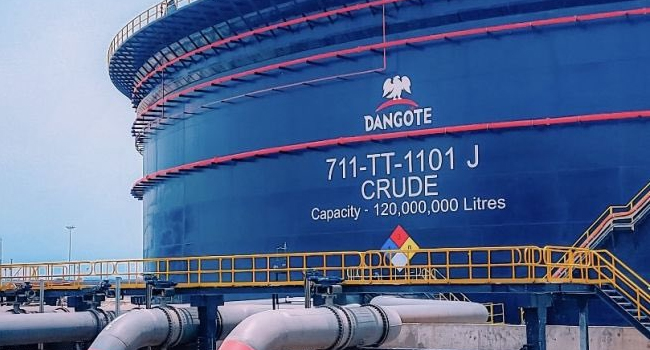
The Federal Government is set to supply up to 400,000 barrels of Nigerian crude oil daily to the Dangote refinery through a naira-for-crude agreement, according to a Bloomberg report.
This initiative is expected to roll out over the next two months, delivering a total of 24 million barrels from October to November 2024.
This boost in processing capacity could significantly alter operations at the refinery and transform the local oil landscape, impacting import and export dynamics in the region.
As the naira-for-crude deal commences, Bloomberg News predicts that Dangote’s increasing reliance on domestic crude may lead to a decline in Nigeria’s crude exports, potentially disrupting the Atlantic oil market.
With a capacity of 650,000 barrels per day—the largest in Africa and Europe—the refinery will require 13 to 14 shipments, drawing from Nigeria’s usual monthly output of around 50. Analyst Ronan Hodgson from FGE predicts that the West African crude market will experience “substantial tightening” in the fourth quarter, potentially driving Nigerian exports below 1 million barrels a day.
While some shipments may encounter delays (with October allocations already including two cargoes pushed back from September), the planned volumes are a significant increase from the average of 255,000 barrels per day that Dangote processed in the first half of the year as it ramped up operations. Currently operating at 60-70% capacity, Dangote is expected to reach full capacity within months, according to Vartika Shukla, Chairman of Engineers India Ltd.
Additionally, Dangote has been scaling back its imports of US crude, having previously relied heavily on WTI Midland, now shifting its purchasing strategy.
Last month, the Nigerian National Petroleum Corporation agreed to supply crude to Dangote in exchange for being the exclusive distributor of the refinery’s gasoline production. If this ramp-up continues, Nigeria may finally achieve its long-standing objective of reducing expensive oil product imports.
“If the refinery runs at higher rates, the West African market for gasoline and diesel imports will shrink extremely quickly,” FGE’s Hodgson said.
Over the weekend, Federal Government revealed that it had officially commenced the sale of crude oil and refined petroleum products in naira, raising hopes that the prices of petroleum products would be somewhat insulated from global oil volatilities.
Minister of Finance and Coordinating Minister of the Economy, Mr Wale Edun, in a statement signed the ministry’s Spokesman, Mr Mohammed Manga, announced that, in line with the Federal Executive Council (FEC) directive, the sale of crude oil and refined petroleum products in naira officially commenced as of October 1, 2024.
Edun said: “Following a meeting of the Implementation Committee, Chaired by the Minister of Finance and Coordinating Minister of the Economy to conduct a post-commencement review of the Crude Oil and Refined Products Sales in Naira initiative, the commencement of this strategic initiative was affirmed by key stakeholders”.
The strategic initiative according to Edun, s expected to have a lasting impact on Nigeria’s economy, fostering growth, stability, and self-sufficiency, especially as the country continues to navigate the complexities of global markets.
Comments